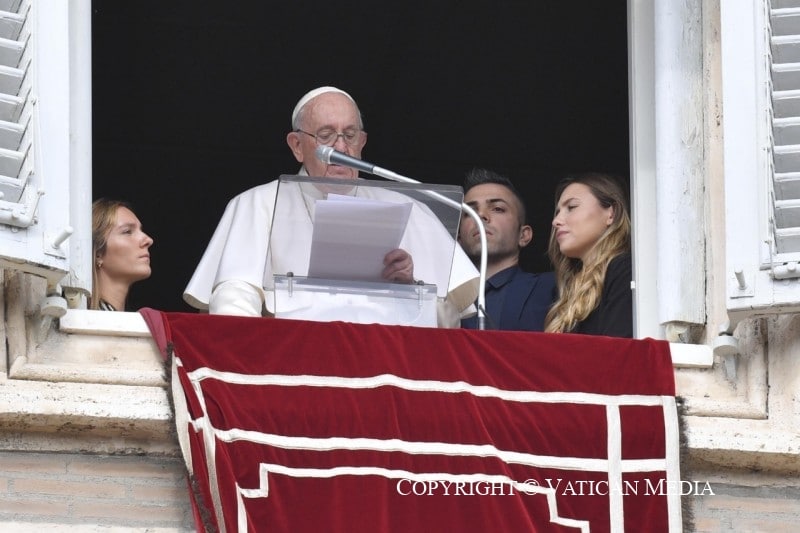The Pope’s words at the recital of the Angelus At 12 noon today, the Holy Father Francis looked out of the window of his study in the Vatican Apostolic Palace Vatican Apostolic Palace to recite the Angelus with the faithful and pilgrims gathered in St Peter’s Square.
These are the Pope’s words in introducing the Marian prayer:
Before the Angelus
Dear brothers and sisters, buongiorno!
The Gospel of today’s Liturgy presents us a parable with two protagonists, a pharisee and a publican (Lk 18:9-14), that is, a religious man and an avowed sinner. Both of them go up to the Temple to pray, but only the publican truly lifts himself up to God, because he humbly descends into the humility of himself and he presents himself as he is, without masks, with his poverty. We might say, then, that the parable lies between two movements, expressed by two verbs: to rise and to descend.
The first movement is to rise. Indeed, the text begins by saying: “Two people went up to the temple area to pray” (v. 10). This aspect recalls many episodes in the Bible, where in order to encounter the Lord, one goes up to the mountain of his presence: Abraham goes up on the mountain to offer the sacrifice; Moses goes up Mount Sinai to receive the Commandments; Jesus goes up the mountain where he is transfigured. To rise, therefore, expresses the need of the heart to detach itself from a flat life in order to go towards the Lord; to rise up from the plateau of our ego to ascend towards God, freeing oneself of one’s own “I”; to gather what we live in the valley to bring it before the Lord. This is “rising”, and when we pray, we rise.
But to live the encounter with him and to be transformed by prayer, to rise up to God, a second movement is necessary: to descend. How come? What does this mean? In order to rise towards him, we must descend within ourselves: to cultivate the sincerity and humility of the heart that give us an honest outlook on our frailties and our inner poverty. Indeed, in humility we become capable of bringing what we really are to God, without pretense: the wounds, the sins and the miseries that weigh on our hearts, and to invoke his mercy so that he may heal us, restore us and raise us up. It will be he who raises us up, not us. The more we descend with humility, the more God raises us up.
Indeed, the publican of the parable humbly stops at a distance (cf. v. 13) – he does not come close, he is ashamed – he asks for forgiveness, and the Lord raises him up. Instead, the pharisee exalts himself, self-assured, convinced that he is fine: standing up, he begins to speak with the Lord only of himself, praising himself, listing all the good religious works he does, and disdaining others: “I am not like that person there…”. Because this is what spiritual arrogance does. “But father, why are you talking to us about spiritual arrogance?” Because we all risk falling into this trap. It leads you to believe yourself righteous and to judge others. This is spiritual arrogance: “I am fine, I am better than the others: this person does this, that one does that…”. And in this way, without realizing, you adore your own ego and obliterate your God. It revolves around oneself. This is prayer without humility.
Brothers, sisters, the pharisee and the publican concern us closely. Thinking of them, let us look at ourselves: let us confirm whether, in us, as in the pharisee, there is the conviction of one’s own righteousness (cf. v. 9) that leads us to despise others. It happens, for instance, when we seek compliments and always make a list of our own merits and good works, when we concern ourselves with how we appear rather than how we are, when we let ourselves be trapped by narcissism and exhibitionism. Let us beware of narcissism and exhibitionism, based on vainglory, that lead even us Christians, priests and bishops, always to have one word on our lips. Which word? “I”: “I did this, I wrote that, I said it, I understood it before you”, and so on. Where there is too much “I”, there is too little God. In my country, these people are called “Me, with me, for me, only me”, this is the name of those people. And once upon a time they used to talk about a priest who was like that, self-centred, and the people, jokingly, used to say, “When he incenses, he does it backwards, he incenses himself”. It is like that; it even makes you seem ridiculous.
Let us ask the intercession of Mary Most Holy, the humble servant of the Lord, the living image of what the Lord loves to accomplish, overthrowing the powerful from their thrones and raising the humble (cf. Lk 1:52).










